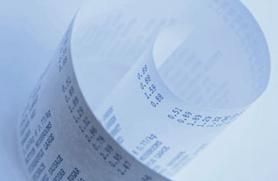It seems there's no escaping Bisphenol-A (BPA). Another study, published in Green Chemistry Letters and Reviews earlier this summer, and an Environmental Working Group (EWG) research report have shown that measurable levels of BPA are still being found on thermal paper receipts used for cash registers and credit card/debit machines.
In the study authored by John C. Warner, eight of 10 cash register receipts collected from suburban Boston-area stores had measurable levels of BPA, and the EWG report found 14 of 36 receipts collected from fast-food restaurants, retailers, grocery stores, gas stations, and post offices tested positive for BPA, an endocrine-disrupting chemical used in plastics.
Advertisement
Most research into the effects of BPA in humans (and animals) have focused on dietary exposure, such as via liquids in plastic drinking bottles or foods that are packaged in cans lined with plastics containing BPA. We simply don't know what effect BPA has when exposure is via the skin. But think about all the times you touch your lips in a day. Or the times you've grabbed a receipt in your mouth as you load the kids into the car. It's easy to see how easily the BPA on receipts can be transferred to our mouths.
There's no way to tell if a thermal paper receipt contains BPA or not, so unless governments ban BPA from receipts, it's up to consumers to limit exposure whenever possible. And though it may seem like a futile effort, a few simple steps can help you limit your interaction with the chemical.
First and foremost, if you don't need a receipt, leave it -- and ask the cashier not to print it if possible. For many small purchases and unless you're purchasing something you may want to take back, a receipt is unnecessary. As an added bonus, you'll be reducing paper waste.
If you need the receipt, ask the cashier to place it in the bag. When you get home, remove receipts from all bags, place them in a drawer or space on your desk just for the receipts, and avoid further unnecessary contact. Be sure to wash your hands well after handling receipts.
Do not place receipts in bags with food items, especially items you eat raw. If you have to, place the receipt in your wallet or checkbook, or in a business card holder or coin purse dedicated for receipts.
If you keep all receipts for balancing your checkbook, store them in one place and always wash your hands well after you have balanced the books.
If you own a company that uses thermal paper receipts, check with your supplier to see if the paper contains BPA, and if it does, switch to a BPA-free paper manufacturer, such as Appleton Paper, the largest manufacturer of thermal paper receipts in the U.S. Appleton went BPA-free in 2006.
Advertisement
